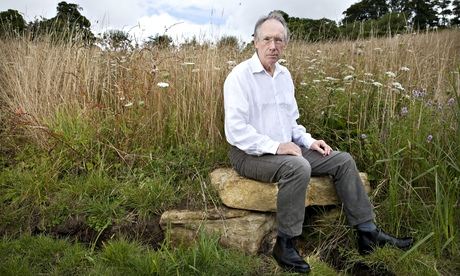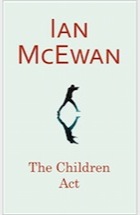In Ian McEwan's book The Children Act, a high court judge must decide whether a teenage boy lives or dies. In his own life, the novelist feels mortality pressing in – but, he says, he's enjoying himself far too much to slow down just yet

‘Writing is a delightful, privileged existence – assuming you can live by it’: Ian McEwan photographed by Karen Robinson for the Observer
Ian McEwan was in a reflective, autumnal mood when we met recently to talk about his new novel, The Children Act. It's a mood that echoes the dominant note of this short book. McEwan's prose has always been pared down but the full foliage of, say, Atonement, has now become the thinning leaf of The Children Act, whose title refers to the landmark legislation of 1989 governing the welfare of minors.
 This sombre tale of barely 55,000 words is a study in grey, a characteristically haunting examination of unarticulated love, of an old marriage in crisis, and a mature woman at the end of her tether. "I wanted," says McEwan, in his forensic, slightly nasal but commanding drawl, "to get inside the mind of a woman who is professionally totally engaged, but with turmoil in her life, who comes into a situation in which all kinds of buried feelings are stirred up…"
This sombre tale of barely 55,000 words is a study in grey, a characteristically haunting examination of unarticulated love, of an old marriage in crisis, and a mature woman at the end of her tether. "I wanted," says McEwan, in his forensic, slightly nasal but commanding drawl, "to get inside the mind of a woman who is professionally totally engaged, but with turmoil in her life, who comes into a situation in which all kinds of buried feelings are stirred up…"
Fiona Maye is a high court judge who presides in the family division. She's flinty, cerebral and childless. Her legal judgments exhibit a crisp and even-handed prose that's "almost ironic, almost warm". Like McEwan, she loves classical music, especially Bach. Unlike him, she can also perform it as an amateur, especially the second Partita. This makes her sound horribly over-accomplished but McEwan says he did not want her to be "a goody two-shoes".
More
 This sombre tale of barely 55,000 words is a study in grey, a characteristically haunting examination of unarticulated love, of an old marriage in crisis, and a mature woman at the end of her tether. "I wanted," says McEwan, in his forensic, slightly nasal but commanding drawl, "to get inside the mind of a woman who is professionally totally engaged, but with turmoil in her life, who comes into a situation in which all kinds of buried feelings are stirred up…"
This sombre tale of barely 55,000 words is a study in grey, a characteristically haunting examination of unarticulated love, of an old marriage in crisis, and a mature woman at the end of her tether. "I wanted," says McEwan, in his forensic, slightly nasal but commanding drawl, "to get inside the mind of a woman who is professionally totally engaged, but with turmoil in her life, who comes into a situation in which all kinds of buried feelings are stirred up…"Fiona Maye is a high court judge who presides in the family division. She's flinty, cerebral and childless. Her legal judgments exhibit a crisp and even-handed prose that's "almost ironic, almost warm". Like McEwan, she loves classical music, especially Bach. Unlike him, she can also perform it as an amateur, especially the second Partita. This makes her sound horribly over-accomplished but McEwan says he did not want her to be "a goody two-shoes".
More

No comments:
Post a Comment